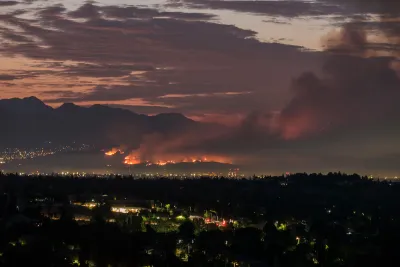A new study estimates that LA County must invest billions of dollars before 2040 to protect residents from extreme heat, increasing precipitation, worsening wildfires, rising sea levels, and climate-induced public health threats.

With climate-driven disasters in Southern California getting more intense each year, it is more important than ever for communities to invest in a wide range of climate adaptation and resilience projects and measures. As reported by Hayley Smith of the LA Times, a recently released new study offers estimated costs of preparing for and adapting to 14 different climate impacts on municipal, county, state, and federal governments in Los Angeles County.
According to the report by The Center for Climate Integrity, the most costly adaptation categories are related to precipitation and heat, including an estimated $4.3 billion for improved stormwater management, $2.5 billion for cool pavement investments, and $1.4 billion for tree canopies to combat urban heat islands. Other costs include wildfire mitigation, coastal defense and infrastructure protection, building upgrades for cooling and air conditioning, and responses to vector-borne diseases.
The study estimates that municipal, county, state, and federal governments will need to expend at least $12.5 billion through 2040, more than $9 billion of which will be incurred by municipal governments. The total cost equates to about $780 million annually to protect communities in L.A. County from extreme heat, changing precipitation, wildfires, rising sea levels, and climate-induced public health threats.
FULL STORY: L.A. County faces $12.5 billion in climate costs through 2040, study says

National Parks Layoffs Will Cause Communities to Lose Billions
Thousands of essential park workers were laid off this week, just before the busy spring break season.

Retro-silient?: America’s First “Eco-burb,” The Woodlands Turns 50
A master-planned community north of Houston offers lessons on green infrastructure and resilient design, but falls short of its founder’s lofty affordability and walkability goals.

Delivering for America Plan Will Downgrade Mail Service in at Least 49.5 Percent of Zip Codes
Republican and Democrat lawmakers criticize the plan for its disproportionate negative impact on rural communities.

Test News Post 1
This is a summary

Test News Headline 46
Test for the image on the front page.

Balancing Bombs and Butterflies: How the National Guard Protects a Rare Species
The National Guard at Fort Indiantown Gap uses GIS technology and land management strategies to balance military training with conservation efforts, ensuring the survival of the rare eastern regal fritillary butterfly.
Urban Design for Planners 1: Software Tools
This six-course series explores essential urban design concepts using open source software and equips planners with the tools they need to participate fully in the urban design process.
Planning for Universal Design
Learn the tools for implementing Universal Design in planning regulations.
EMC Planning Group, Inc.
Planetizen
Planetizen
Mpact (formerly Rail~Volution)
Great Falls Development Authority, Inc.
HUDs Office of Policy Development and Research
NYU Wagner Graduate School of Public Service





























